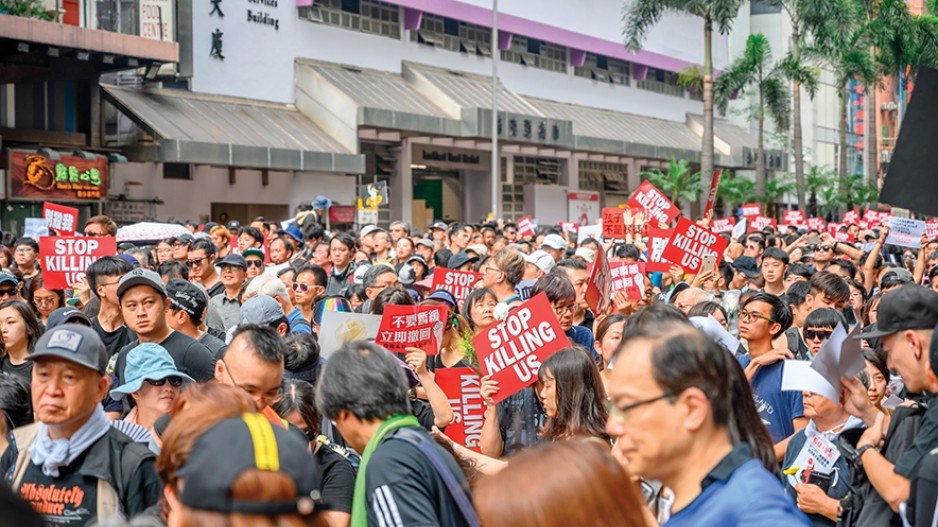The public unrest in Hong Kong dominated international headlines for most of the summer. A series of protests that began over the proposed imposition of an “extradition bill” has continued for more than 100 days. While the extradition bill has already been withdrawn, the protesters have been steadfast in other demands, including the right to vote directly for Hong Kong’s legislative council and chief executive.
The close ties between British Columbia and Hong Kong cannot be ignored. Many of the almost 400,000 residents of Hong Kong who settled in Canada in the last two decades of the 20th century chose Metro Vancouver as their home. The Tiananmen Square crackdown in 1989 is often cited as one of the reasons that led many to look at Canada, and British Columbia in particular, as a destination.
Even before the protests in Hong Kong began to develop, relations between Canada and the People’s Republic of China were awkward. A February survey by Research Co. showed that 63% of Canadians supported the actions of the federal government after the arrest of Huawei Technologies Co. Ltd. chief financial officer Meng Wanzhou in Vancouver following an extradition request from the United States.
A followup poll, conducted in July, confirmed that two-thirds of Canadians (68%) rejected Huawei’s participation in the development of Canada’s 5G (fifth generation) mobile networks, including four in five British Columbians (81%). When this survey was conducted, Canadians were keenly aware of China’s continued confinement of two Canadians – Michael Kovrig and Michael Spavor – on espionage allegations.
This month, Research Co. asked British Columbians about Hong Kong. The survey allowed for a review of how residents with ties to the region – that is, residents of British Columbia who were born in, have lived in or have travelled to Hong Kong – perceive the latest developments.
Across the province, a majority of residents (53%) say they have been following the protests against the extradition bill in Hong Kong “very closely” or “moderately closely.” Among British Columbians who have ties to Hong Kong, the proportion rises to an impressive 81%.
There are differences when British Columbians are asked about how the Canadian government should behave. A third of residents (34%) believe Ottawa should do nothing or avoid getting involved in the situation in Hong Kong. But almost two in five (39%) would “definitely” or “probably” welcome Canada’s support for the protesters. Just over one in 20 British Columbians (6%) thinks our federal government should support the Chinese government.
British Columbians who voted for the BC Liberals and the BC Green Party in 2017 are more likely to urge for neutrality (40% and 44%, respectively) than those who voted for the BC New Democratic Party (NDP) (29%).
In fact, almost half of BC NDP voters (49%) want Ottawa to openly support the protesters, a significantly higher proportion than what is observed among BC Liberals (38%) and BC Greens (35%).
Age is also a factor, with British Columbians aged 55 and over (45%) calling for the federal government to avoid getting involved, compared with 29% for those aged 35 to 54 and 25% for those aged 18 to 34.
This Canadian government has issued stern warnings to other nations. Earlier this year, Canada downgraded its diplomatic relations with Venezuela. Statements from Minister of Foreign Affairs Chrystia Freeland have described the South American country as “sliding deeper into dictatorship” and its government as “an illegitimate regime.”
In any case, half of British Columbians (49%) are worried that the current situation will lead to many residents of Hong Kong moving to British Columbia. In addition, more than three in five British Columbians (62%) believe Hong Kong would be better off today if it had remained under the administration of the United Kingdom.
The wariness of British Columbians towards the People’s Republic of China was unmistakable earlier this year in questions related to Huawei. It is evident again when it comes to the present and future of Hong Kong.
The protests in Hong Kong endure as the Union of British Columbia Municipalities meets this week. There will be a wine-and-dine reception sponsored by the Chinese government. Several Metro Vancouver mayors, including Vancouver’s Kennedy Stewart, Delta’s George Harvie and Port Coquitlam’s Brad West, have said they will not be in attendance for that particular event.
Numbers like the ones featured in this survey should serve as a caution to politicians who see no problem in developing a cosy relationship with this foreign government. The proportion of British Columbians who take China’s side in Hong Kong’s fight for democracy is negligible. •
Mario Canseco is the president of Research Co.
Results are based on an online study conducted from September 11 to September 14, 2019, among 800 adults in British Columbia. The data has been statistically weighted according to Canadian census figures for age, gender and region in British Columbia. The margin of error, which measures sample variability, is plus or minus 3.5 percentage points, 19 times out of 20.




